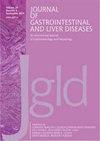Yoga Therapy in Functional Dyspepsia. A Narrative Review
IF 2
4区 医学
Q3 GASTROENTEROLOGY & HEPATOLOGY
引用次数: 0
Abstract
Functional dyspepsia (FD) is a common upper gastrointestinal disorder, characterized by bothersome epigastric pain or burning, fullness after meals or early satiety. The precise pathophysiology remains incompletely understood but may include the role of disordered gut-brain communication leading to disturbances in gastro-duodenal physiological functioning. Even if there are several pharmacological treatment options, it is a chronic and relapsing disorder with persistent symptoms that makes its management difficult. Yoga is a fast-spreading complementary and alternative medicine (CAM) specialty, that has gained attention in the medical field for its ability to address the physical, emotional, mental and social aspects of health and disease. Various other CAM therapies are being used for FD with varying efficacy. However, apart from one research study that used yoga therapy on abdominal pain related functional gastrointestinal disorders in children which included a few FD cases as well (11.6%), no other study using yoga therapy has been done in FD as per our best knowledge. Therefore, in the present review, we have summarized the current scientific understanding of the probable effects of yoga on the pathophysiological mechanisms involved in FD (gastric motility, fundic accommodation, hypersensitivity, duodenal inflammation, psychological distress and gut-brain dysfunction). The literature suggests yoga can have a beneficial role in the management of FD. However, rigorous research and clinical trials are required to confirm the same.功能性消化不良的瑜伽疗法。叙述性综述
功能性消化不良(FD)是一种常见的上消化道疾病,其特征是令人烦恼的上腹痛或烧灼感、餐后饱胀或早饱。确切的病理生理学尚不完全清楚,但可能包括肠道与大脑沟通失调导致胃十二指肠生理功能紊乱的作用。即使有多种药物治疗选择,但由于该病是一种慢性、复发性疾病,且症状持续存在,因此治疗难度很大。瑜伽是一种快速传播的补充和替代医学(CAM)专业,因其能够解决健康和疾病的生理、情感、心理和社会方面的问题而受到医学界的关注。其他各种 CAM 疗法也被用于 FD,疗效各异。然而,据我们所知,除了一项将瑜伽疗法用于治疗与腹痛相关的儿童功能性胃肠道疾病(其中也包括一些 FD 病例(11.6%))的研究外,还没有其他将瑜伽疗法用于 FD 的研究。因此,在本综述中,我们总结了目前科学界对瑜伽对 FD 所涉及的病理生理机制(胃肠蠕动、胃底容纳、超敏反应、十二指肠炎症、心理困扰和肠脑功能障碍)的可能影响的认识。文献表明,瑜伽对治疗 FD 有益。然而,这还需要严格的研究和临床试验来证实。
本文章由计算机程序翻译,如有差异,请以英文原文为准。
求助全文
约1分钟内获得全文
求助全文
来源期刊
CiteScore
3.20
自引率
0.00%
发文量
61
审稿时长
6-12 weeks
期刊介绍:
The Journal of Gastrointestinal and Liver Diseases (formerly Romanian Journal of Gastroenterology) publishes papers reporting original clinical and scientific research, which are of a high standard and which contribute to the advancement of knowledge in the field of gastroenterology and hepatology. The field comprises prevention, diagnosis and management of gastrointestinal and hepatobiliary disorders, as well as related molecular genetics, pathophysiology, and epidemiology. The journal also publishes reviews, editorials and short communications on those specific topics. Case reports will be accepted if of great interest and well investigated.

 求助内容:
求助内容: 应助结果提醒方式:
应助结果提醒方式:


